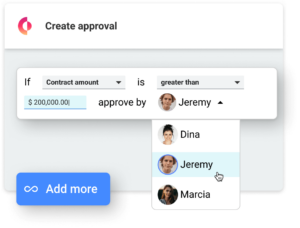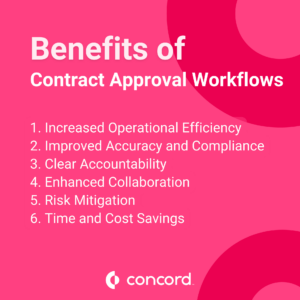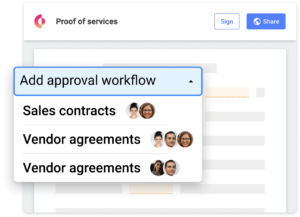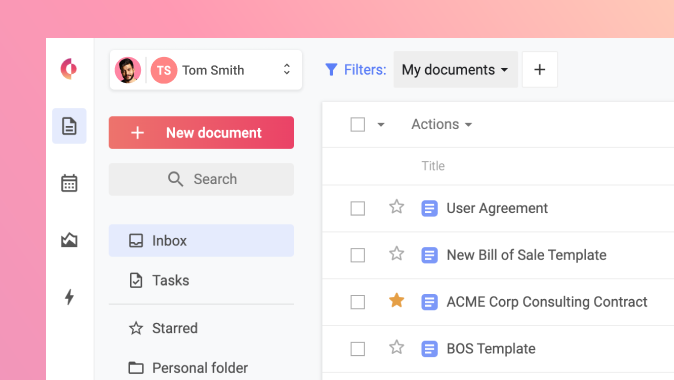Mastering Contract Approval Workflows: A Comprehensive Guide
Table of contents
- What is a contract approval workflow?
- Who should approve contracts?
- The importance of contract approval workflows
- The benefits of an efficient contract approval process
- How to streamline contract workflows?
- Contract approval process - Conclusion
-
About Concord
Effortless contract management, from drafting to e-signing and beyond. Book a live demo to see Concord in action.
Request demo
The contract approval process is an essential part of any business. Without proper governance and approval workflows, agreements might be signed without the proper oversight, leaving the business exposed to risk. By mastering contract approval workflows, businesses can ensure that all contracts are signed with the necessary due diligence and oversight.
This comprehensive guide will provide a deep dive into contract approval workflows. We’ll discuss the importance of setting up effective contract workflows, as well as how to ensure that contract approvals are handled efficiently.
What is a contract approval workflow?
A contract approval workflow is a systematic process used by organizations to review, modify, and approve contracts before finalization. It involves multiple steps including drafting, internal reviews, legal compliance checks, and final approvals, ensuring that contracts meet legal standards and organizational requirements.
It is an important part of the contract lifecycle management process and helps to ensure that the agreement is reviewed and approved by the appropriate parties. Therefore, it’s an essential part of any business.
The approval process typically begins with an initial review of the contract by the organization’s legal team. After the initial legal review, the agreement is sent to the relevant stakeholders for acceptance. After all the stakeholders have agreed to the contract, it will be sent for final approval to the last approver.
The approval workflow is important to ensure that the document is properly reviewed and approved and that all parties involved in the process are aware of the terms and conditions of the agreement.
Example of a contract approval process
Below is an example of an internal contract approval workflow for a new sales contract:
- Draft Creation:
- The sales team drafts the contract based on client negotiations.
- Departmental Checks:
- Finance checks budget alignment.
- The sales manager reviews business terms.
- Legal Review:
- The legal team ensures legal compliance and adds necessary clauses.
- Incorporate Feedback:
- Revise the contract based on internal reviews.
- Final Approval:
- Senior management approves the final draft.
- Pre-Signature Preparation:
- Prepare and format the contract for signing.
- Internal Sign-off:
- An authorized internal representative signs the contract.
This streamlined workflow ensures efficient internal approval before sending the contract for external signature.
Who should approve contracts?
The approval process is an important part of the contract management process. It’s essential to ensure that all agreements are properly reviewed and approved before being signed. But who should be responsible for approving contracts?
Common parties that approve contracts in organizations include:
- Legal Team
- Finance Team
- Department Head(s)
- Senior Management
The first step in any contract approval system is to establish a clear set of roles and responsibilities. Depending on the size of the organization, this could include a single individual or a team of people. It’s important to ensure that the right parties are involved in the process and that they understand their roles. This could include a legal department or an executive team.
Once the roles and responsibilities are clear, the next step is to create a workflow for approving contracts. This should include a clear timeline for when agreements should be reviewed and approved, as well as who should be involved in the approval process. The workflow should also include any additional steps that need to be taken, such as obtaining signatures or obtaining legal advice. By having a clear workflow in place, organizations can ensure that agreements are properly reviewed and approved in a timely manner.

The importance of contract approval workflows
No matter the size of a company, a set process for approving contracts is an essential part of any business’s workflow. Organizations that fail to implement a good system for approvals are at risk of making costly mistakes.
Without an effective process in place, agreements may not be properly reviewed and approved, leading to errors or omissions that could have serious legal and financial consequences. Additionally, without a clear approval process, there is no way to ensure that all parties involved are aware of the terms and conditions of the agreement. This can lead to misunderstandings and disputes down the line.
Furthermore, without an automated system in place, organizations may struggle to keep track of contracts and their status, leading to delays in getting agreements signed off on time. This, in, turn, can result in costly mistakes and missed opportunities. Ultimately, failing to implement a contract approval workflow process can result in significant losses for an organization both financially and legally.
In short, approval workflows are important because they:
- Prevent costly mistakes through a structured process.
- Ensure thorough review of contracts to avoid legal and financial issues.
- Guarantee that all parties understand the contract terms, reducing misunderstandings and disputes.
- Aid in efficient tracking of contracts, avoiding delays and missed opportunities.
- Protect the organization from significant financial and legal losses.
The benefits of an efficient contract approval process
Having an efficient contract workflow can make a huge difference to a company. Streamlined systems for approvals help to ensure that documents are approved quickly and accurately, saving time and money.
Other benefits of a well-organized contract approval process include:
- Increased Operational Efficiency: By clearly defining each stage in the process, teams can work more seamlessly, accelerating the process and saving valuable time.
- Improved Accuracy and Compliance: With a structured workflow, agreements undergo thorough review and verification, minimizing the risk of errors and ensuring compliance with regulatory standards.
- Clear Accountability: Workflows for contract approvals designate responsibility at each step, fostering transparency and accountability throughout the process.
- Enhanced Collaboration: Workflows promote better collaboration between various departments, as they clearly outline the responsibilities and tasks of each team and individual.
- Risk Mitigation: A well-defined workflow can help identify potential risks and issues early in the process, allowing for proactive resolution and mitigation of business risks.
- Time and Cost Savings: By eliminating manual processes, reducing redundancy, and minimizing errors, contract approval workflows can result in significant time and cost savings for the organization.

How to streamline contract workflows?
Manually approving contracts can be tedious. Therefore, to streamline your operations, you can automate your approval process. The best way to do this is to use contract management software with a contract approval workflow feature.
Automated workflows for approving contracts can be tailored to meet specific requirements and can be used to ensure that contracts are approved in a timely manner without sacrificing accuracy. This means that agreements are approved faster, while still being compliant with all regulations. Additionally, it can help to ensure that the right people approve contracts and that all necessary information is collected.
An efficient approval system also allows for better visibility and control of the entire process, helping to reduce the risk of contract disputes or delays. By leveraging modern technology to streamline the process, businesses can save time, money, and effort, while ensuring accuracy and compliance.

Using Concord to automate the approval process
As said, the best way to improve the contract approval process is by automation through a CLM tool. You can unlock the potential of contract management software with Concord’s smart approval workflows designed to streamline the process.
Concord’s platform offers a range of contract approval features, including:
- the ability to create unlimited approval workflows,
- customizable, multi-step approvals,
- conditional approvals,
- approval workflow library,
- and automatic notifications for the approvers involved, and much more!
Concord users can easily add approval workflows to contract templates, ensuring consistency and compliance across all new agreements. The software also provides organizational clarity, giving employees clear guidelines and boundaries throughout the approval process.
By leveraging such workflow capabilities, businesses can significantly improve their contract automation and management goals, leading to increased efficiency and reduced turnaround times.
Contract approval process – Conclusion
In conclusion, the contract approval process is an essential step for most organizations, but it can be a time-consuming affair without an effective workflow. Having a standardized model that outlines who should be responsible for approving contracts is necessary to create an effective and efficient process.
With automated approval workflows, you can reduce risks and save time and money by eliminating manual tasks. Streamlining your existing processes with contract management software like Concord is the key to optimizing efficiency and reducing budget costs.



